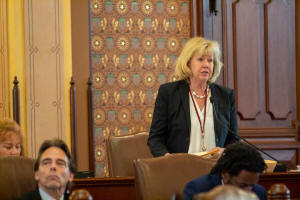Bill establishes commission to increase communication on public health
issues
[May 23, 2025]
By Jade Aubrey and UIS Public Affairs Reporting (PAR)
SPRINGFIELD — A bill creating an interdisciplinary commission to study
the interplay between animals, the environment and infectious disease
within the Illinois Department of Public Health passed the House
unanimously Wednesday.
Senate Bill 291 aims to establish the One Health Commission to aid in
communication and collaboration between the state’s physicians,
veterinarians, scientific professionals and state agencies on the topics
of public health and safety, particularly when it comes to diseases that
originate or mutate in animals.
“I think it gives us an advantage so that we have a little bit to be
prepared, hopefully there will never be another COVID or another avian
flu, but it does give us kind of a leg up in how to plan and how to
prepare for that,” bill sponsor Sen. Julie Morrison, D-Lake Forest, told
Capitol News Illinois after the bill passed.
The bill’s passage comes after federal action in 2021 and 2023
instructed the Centers for Disease Control and Prevention to create One
Health framework in collaboration with other federal agencies. In
February, the CDC launched the National One Health Framework in an
effort to protect the people, animals and environment across America
from zoonotic diseases, which are viruses or bacteria passed from
animals to humans.
Although the term “one health” has been used by scientists since the
1800s, the CDC says it only gained public traction in the 20th century
and even more so after the COVID-19 pandemic. Current attention on the
issue comes amid concerns about the avian flu, which the IDPH director
deemed not an “active risk” in February.

“A One Health approach is important because approximately 60% of known
infectious diseases in humans and 75% of emerging infectious diseases
originate from animals,” the bill language reads. “Animals can serve as
early warning indicators of potential public health threats, and robust
agricultural and environmental health systems are integral to public
health preparedness and response efforts.”
Two other states have enacted One Health frameworks. After a 2021
Congressional report, New Jersey created a One Health Task Force, and
after a 2023 Congressional act, the state of Washington started a One
Health Needs Assessment Report.
Some of the issues these One Health frameworks deal with include
“zoonotic diseases, neglected tropical diseases, vector-borne diseases,
antimicrobial resistance, food safety and food security, environmental
contamination,” according to the CDC.
SB291 tasks the One Health Commission with providing feedback and
support to state agencies and local governments on zoonotic disease
outbreaks in both humans and animals. Also, the bill directs the
commission to develop and integrate new reductions of hazards to humans,
animals and the environment into current public health strategies.
[to top of second column]
|

Sen. Julie Morrison, D-Lake Forest, speaks on the Senate floor on
Wednesday, May 21, 2025. (Capitol News Illinois photo by Jerry
Nowicki)

It will also improve health surveillance tools used by multiple agencies
and organizations, as well as provide further education to public health
and agricultural health professionals who prescribe antibiotics,
including recommending the use of antibiotic alternatives.
Currently, Morrison said agencies and organizations lack the proper
communication between their fields that is needed to tackle public
health threats. SB291 aims to increase those communications by bringing
public health experts together.
One Health Commission members will include the IDPH director, the
president of the University of Illinois, the directors of six other
state agencies, and the director of Commerce and Economic Opportunity,
who will be an advisory, non-voting member. Others on the commission
will include two licensed veterinarians, two licensed physicians – one
of which must have expertise in infectious diseases surveillance – and
four academic experts appointed by the director of IDPH.
Commission members would be unpaid.
Why veterinarians?
“Veterinarians are not just people who take care of dogs,” Morrison
said. “We purchase the beef that veterinarians treat and care for. I
mean, it’s even things like hormones, its antibiotics, it’s things that
go into the animal population that we then end up consuming one way or
the other.”
The commission will provide the General Assembly and governor with a
report by Jan. 1, 2028. Among other things, the report will include an
assessment of One Health surveillance and response systems as well as
policy recommendations to increase public health and safety in the
state.
And although the original bill language labeled the congregation of
state officials and experts as a “task force,” the bill sponsor changed
the language to a “commission” after the House committee hearing in
March.
“You know, a task force is usually really short, and it has a report to
the General Assembly and then it goes away,” Morrison said. “I think
this speaks to a more permanent organization that’s going to be put in
place.”
SB291 now awaits the governor’s approval to become law after passing
both chambers without opposition.
Capitol News Illinois is
a nonprofit, nonpartisan news service that distributes state government
coverage to hundreds of news outlets statewide. It is funded primarily
by the Illinois Press Foundation and the Robert R. McCormick Foundation.
 |